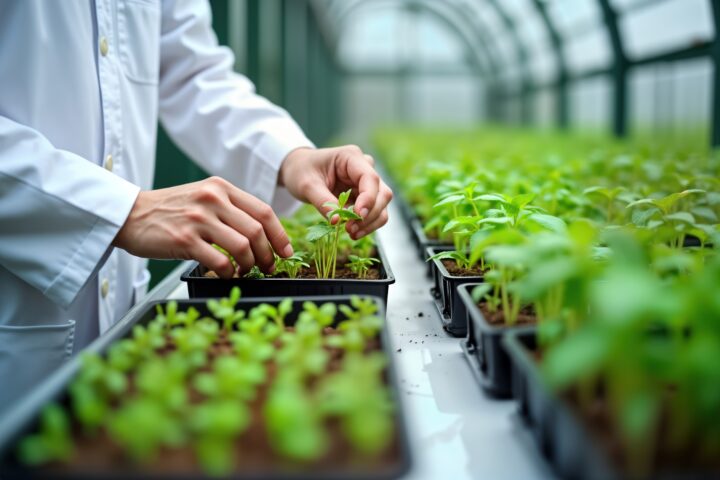How regenerative farming and AI can drive sustainable agriculture
Can regenerative farming, digital technology and artificial intelligence help us resolve the contradiction between sustainable and productive agriculture?
Friday, January 17, 2025
My family has been working the land in Illinois for decades, currently farming about 3,000 acres. Like many farmers, we’re constantly looking for ways to improve our practices – to be more efficient, more productive, and better stewards of the land.
Regenerative agriculture represents a holistic approach to farming that goes beyond simply maintaining the status quo. It aims to actively improve soil health, increase biodiversity, enhance ecosystem services, and capture carbon in the soil.
The key principles of regenerative agriculture emphasise minimising soil disturbance through reduced tillage and keeping the soil covered with crops or residues year-round. It also promotes increasing plant diversity through crop rotation and cover crops, and gradually reducing synthetic inputs over time.
Expanding these sustainable practices to cover 40% of the world’s farmland could play a crucial role in limiting climate change, strengthening the resilience of our food production systems, and protecting both ecological diversity and the economic well-being of farming communities.
As a fifth-generation farmer and CEO of one of world’s largest agriculture technology companies, I’ve seen the challenges and opportunities facing modern agriculture firsthand: how to farm sustainably while maintaining productivity.
On our farm, we’ve implemented several regenerative agriculture practices, including minimum tillage, no-till techniques, the use of cover crops, and precision application of inputs. We’ve seen an increase in available water capacity, higher levels of organic matter, soil organic carbon, total carbon, and active carbon. Additionally, we’ve seen improvements in total nitrogen and extractable phosphorus levels.
Farmers who adopt these regenerative and precision agricultural methods may gain substantial financial benefits over time, with some studies suggesting profit increases as high as 120% according to a World Business Council for Sustainable Development (WBCSD) study from May 2023.
Adding technology
At its core, regenerative agriculture is about working with nature, not against it – and now, we have digital tools and smart farming technologies to help us do so more effectively.
Advanced monitoring systems and precision agriculture have evolved into multi-dimensional solutions, enabling farmers to track improvements and detect issues with unprecedented accuracy. These technologies integrate data from satellites, drones, and soil maps to guide the targeted application of crop protection products and detect diseases and pests early.
Predictive performance analytics are revolutionising farm management by harnessing historical data through artificial intelligence and machine learning. This allows farmers to forecast future conditions and outcomes, transforming reactive farming practices into proactive agricultural management strategies.
According to a recent article in Forbes magazineExternal link, AI in agriculture is projected to grow from $1.7 billion (about CHF1.5 billion) in 2023 to $4.7 billion by 2028. Additionally, a recent article published by the World Economic Forum (WEF) cites that digital agriculture could boost the agricultural GDP of low- and middle-income countries by more than $450 billion, or 28% per annum.
Policy support is crucial
Transitioning to regenerative practices offers significant benefits but comes with challenges. It requires new knowledge, equipment, and time for soil ecosystems to rebalance. Recognising the power of digital and AI, our industry is actively harnessing these technologies not only to support farmers in the field but also to accelerate innovation in agricultural solutions.
However, for regenerative agriculture, digital technologies and AI to reach their full potential, we need supportive policies at local, national, and international levels.
Policymakers, businesses, and governmental bodies must collaborate in addressing farmers’ financial and technological requirements. Implementing incentive programs to offset transition costs can significantly reduce the financial barriers to adopting regenerative methods. Increased research funding is also essential to quantify benefits and refine best practices, ensuring that farmers have access to the most effective and scientifically backed techniques.
The development of carbon markets that reward farmers for sequestering carbon could provide additional economic incentives for regenerative practices. Expanding education and extension services is crucial to spread knowledge and support farmers as they transition to new methods.
Finally, creating regulatory frameworks that encourage innovation in this space can help accelerate the development and adoption of regenerative technologies and practices, including AI and other digital tools that support sustainable farming. But policy and regulatory considerations alone are not enough. We need all players in the complex ecosystem surrounding farmers to create meaningful incentives for adopting technology and regenerative practices in a meaningful way. This especially includes retailers, value chain partners, and financial actors such as providers of microfinance solutions, among others. Our recently announced collaboration with McDonald’s USA and Lopez Foods to help produce beef more sustainably in the United States is a good example of such a holistic approach.
The way forward
As we face the twin challenges of adapting to climate change and feeding a growing population, the combination of regenerative agriculture practices, AI and digital technologies is a crucial component in our toolkit for sustainable farming. This synergy empowers farmers to be active participants in addressing climate change while enhancing their ability to produce food more efficiently and sustainably.
We promote this approach with the full understanding that it might ultimately reduce demand for pesticides. Our guiding principle is not to sell products, but to develop solutions that help farmers to sustainably produce healthy food for society.
As these practices and technologies continue to evolve, we anticipate even greater strides in efficiency and sustainability. By working together – farmers, industry, governments, and consumers – we can create a food system that nourishes both people and the planet for generations to come. This shift is more than adaptation; it’s about proactively shaping a sustainable future for agriculture.
This article was originally developed for the World Economic Forum Annual Meeting 2025 and published on swissinfo.
Related articles

Biotechnology has only just begun
When Frank Schirrmacher cleared the pages of the Frankfurter Allgemeine Zeitung's arts section on 27 June 2000 to publish the human genome, which had just been deciphered for the first time, letter by letter over six pages, biotechnology came to the attention of the general public for the first time.

Faster Approval of Crop Protection Products Long Overdue
Switzerland is busy banning active substances that have also been withdrawn from the EU market. But in the other direction, it is dragging its feet: modern products that are already approved in neighboring countries remain blocked here. That could finally change now. The Economic Affairs and Taxation Committee of the National Council has adopted a corresponding proposal.

Genetic scissors for the future – soon in Switzerland too?
Genome editing is seen as a promising way to make agriculture more sustainable and climate-resilient. But Switzerland is hesitant to approve it. A popular initiative even wants to ban it. But what can CRISPR really do?

Genetic engineering? Yes, of course.
As a consumer, you often don't know: products advertised as GMO-free have long contained genetic engineering. This is a thorn in the side of opponents of genetic engineering. But it is easier to keep quiet about the ‘scandal’ – because something we have been eating for a long time no longer scares us.

